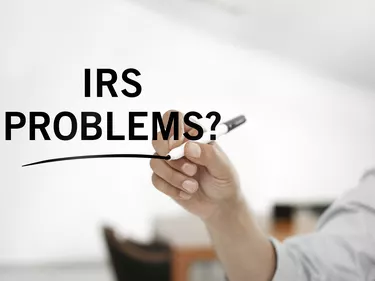
The Internal Revenue Service admitted in January 2022 that it had fallen far, far behind in processing federal tax returns. Millions of returns awaited the agency's attention, confusing its computer system to the extent that it began generating erroneous notices to taxpayers. The IRS has suspended issuance of some notices as a result, effectively telling its computer to back off for the time being.
Why the IRS Pulled the Plug
Video of the Day
The IRS fell significantly behind in processing both original and amended tax returns during the COVID-19 pandemic. It experienced labor shortages just as many businesses did, so several million filed tax returns have simply been sitting and awaiting attention: 6 million original returns and 2.3 million amended returns, according to National Taxpayer Advocate Erin Collins in a testimony to the House Ways and Means Committee. Half of them are reportedly paper returns, which have been scanned by humans and manually entered into the IRS computer system.
Video of the Day
The IRS began the 2022 tax season under the weight of this heavy backlog, while inaccurate, computer-generated, automated notices continued to go out. Needless to say, this has resulted in a lot of highly stressed taxpayers. The IRS finally pulled the plug on the issuance of some of these taxpayer notices in January.
Which Notices Have Been Suspended?
The suspended notices include collection notices for taxes and alerts for unfiled return notices. The agency has issued the following list. Seven of them relate to supposedly unfiled tax returns:
- CP80: When payments have been credited to the current tax year but the IRS doesn't have a record of the return
- CP59: First notice of an unfiled tax return from a previous year
- CP759: Spanish-language version of CP59
- CP516: Second notice of an unfiled tax return from a previous year
- CP616: Spanish-language version of CP516
- CP518: Final notice of an unfiled tax return from a previous year
- CP618: Spanish-language version of CP518
Four more of the suspended notices are automated collection notices. They told taxpayers that they had a balance due to the IRS:
- CP501: First notice
- CP503: Second notice
- CP504: Third notice, including a warning that IRS intends to levy accounts or seize property to collect what it's owed
- 2802C: Instructs taxpayers to adjust their withholding because they have apparently underpaid
Consider also: Do I Get My IRS Refund If I Owe Taxes?
What’s a Taxpayer to Do?
You may have received one of these notices when you shouldn't have before the IRS stopped sending them. The IRS has indicated that you don't have to do anything if you're sure the notice isn't accurate. Don't panic and don't call. But you should take steps to remedy the situation if you received a balance due notice and you do owe a balance or if you did indeed fail to file a tax return for the cited year because this notice hiatus doesn't stop the assessment of interest and penalties. Nor does it relieve you of your normal obligation to submit a timely return in the current filing season.
Consider also: What Is an IRS Civil Penalty?
Check the number on any notice you might have received before the IRS pulled the plug. It may have been sent to you by a real person for a compliance-related issue if it doesn't bear one of the above numbers.
The Internal Revenue Service admitted in January 2022 that it had fallen far behind in processing federal tax returns, confusing its computer system to the extent that it began generating erroneous notices to taxpayers.
Tax laws generally prohibit the IRS from proceeding with a levy, seizure or garnishment if you haven't received notice that you're entitled to a hearing, according to the Taxpayer Advocate Service. So a human agent may send you an unnumbered notice or letter that includes this warning and advice, even while the issuance of certain other computer notices is on hold. You might want to take it to a tax professional or certified public accountant for review to try to pin down where you stand.
Consider also: How to Talk With an IRS Tax Advocate
You can visit the IRS website and look at your taxpayer's account online if you're still not sure or simply want to confirm what the in-error IRS notice is alleging you've failed to do. The site is updated every 24 hours, always assuming that the IRS has a record of your tax filing and is not still waiting for processing.
Consider also: Penalties for a Mistake on Federal Taxes
When Will This Be Resolved?
There's no end date in sight for when these notices might resume. According to the IRS, "These automatic notices have been temporarily stopped until the backlog is worked through," and it will "continue to assess the inventory of prior year returns to determine the appropriate time" to start sending them again.
- Taxpayer Advocate Service: NTA Blog – An Overloaded IRS Stops Certain Automated Notices, But Taxpayers Still Need to File Federal Tax Returns and Pay Outstanding Taxes
- IRS: Taxpayers Can Monitor Their IRS Information Online
- Journal of Accountancy: IRS Identifies Paused Taxpayer Notices
- SST Accountants & Consultants: Taxpayer Notice – IRS Suspends Mailing of Additional Letters
- IRS: Your Online Account